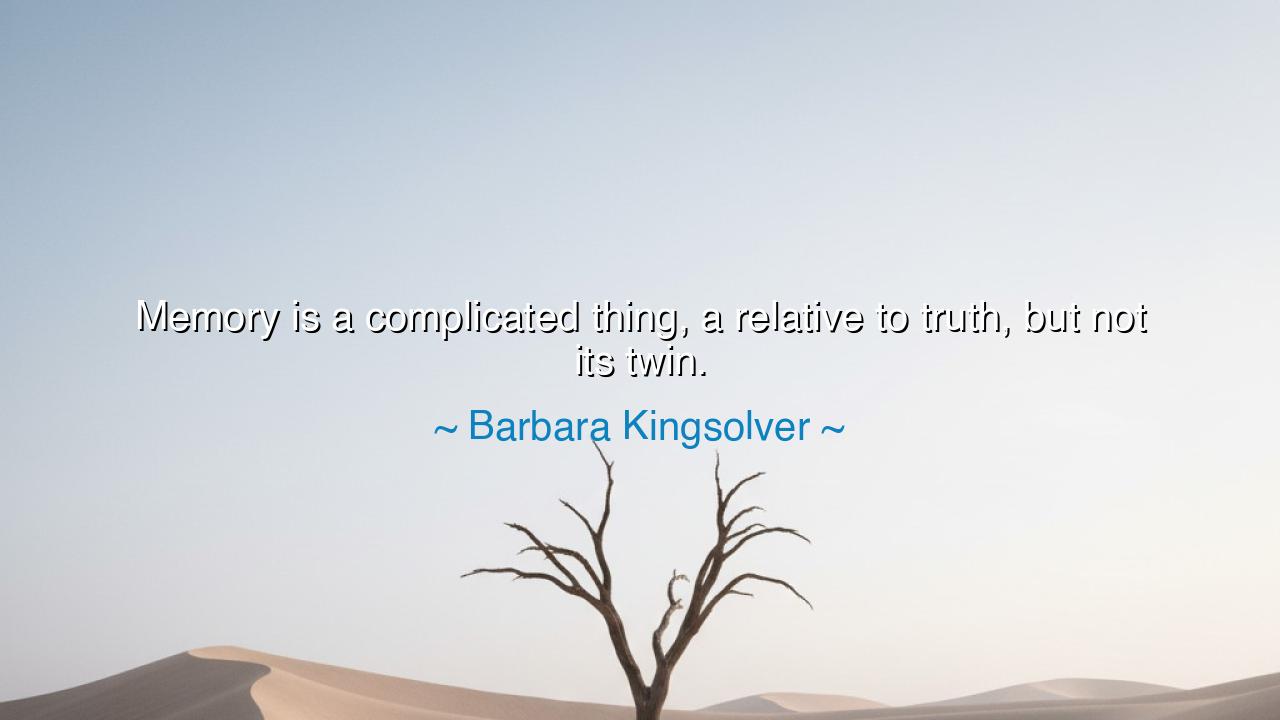
Memory is a complicated thing, a relative to truth, but not its






Hear the gentle but piercing wisdom of Barbara Kingsolver: “Memory is a complicated thing, a relative to truth, but not its twin.” In these words lies a teaching for all generations, for man has long mistaken the shadows of recollection for the light of reality. Memory is kin to truth, born of it and shaped by it, yet they do not walk hand in hand as perfect equals. Where truth is steadfast, memory is pliant; where truth is whole, memory is partial, colored by feeling, softened or sharpened by time.
The ancients knew this frailty. They spoke of the river Lethe, whose waters cause forgetfulness, and of Mnemosyne, goddess of remembrance. They understood that memory is a river ever shifting its course. A man may dip his cup today and taste one thing, but tomorrow the same river bears different waters. Thus Kingsolver reminds us that while memory may point us toward truth, it is never its perfect reflection.
Consider the tale of war veterans who return from battle. Each remembers the same field, the same night, the same sound of guns—but each tells it differently. For one, the night was terror; for another, it was comradeship; for a third, it was confusion. Their memories are not lies, but neither are they pure truth. Each memory is shaped by the heart of the one who carries it, and together they form a chorus that hints at reality but does not contain it whole.
History itself gives us warning. Recall the sinking of the Titanic. Survivors, though sharing one event, gave differing accounts of when the ship broke, how it tilted, what songs were played as it sank. Not all could be correct. But their memories, filtered through fear and grief, still carried fragments of truth. Investigators had to weave these fragments together to approach reality, showing that memory alone is insufficient without careful testing against evidence.
This is why we must carry humility when we speak of our past. For to rely solely on memory is to trust a mirror warped by time. Our minds shape what we recall: we soften the pain of some wounds, we glorify old victories, we sometimes even create what never was. Kingsolver’s words remind us that wisdom lies not in worshiping memory, but in recognizing its limits. To mistake it for absolute truth is to walk a dangerous path, where misunderstanding and conflict may grow.
Yet let us not despise memory, for it is a gift. Though imperfect, it binds us to one another, it carries the stories of our people, it allows us to learn and to love. The art lies in balancing reverence with discernment: cherishing our memories while testing them against evidence, reason, and the accounts of others. In this balance, we honor both memory and truth, giving each its place.
Therefore, children of tomorrow, let your practice be this: treasure your memories, but hold them lightly. When they bring you joy, receive them with gratitude; when they bring you sorrow, learn from them, but do not let them bind you. Always ask: is this memory the whole of truth, or merely my reflection of it? Seek counsel, listen to the voices of others, compare, reflect, and in doing so you will draw closer to the solid ground of reality.
Thus, remember the wisdom of Kingsolver: memory walks beside truth, but it is not its twin. To live wisely is to love both, while bowing to the greater strength of truth. In this way, your life will not be ruled by illusions of the past, but guided by the clarity of what is real.






HNTruong Huy Nguyen
Kingsolver’s statement is a powerful reminder that memory is not infallible. It’s a filter, shaped by time, perception, and personal bias. I wonder, though, if this means that truth is only ever a construct, something we can never fully access. If we can’t fully trust our memories to capture the truth, how do we navigate life’s experiences and decisions? Are we constantly navigating between our perceptions and reality?
GDGold D.dragon
This quote resonates with me because it captures the complexity of memory. It’s not just a simple replay of events, but something that is colored by our perspectives and feelings. Does this mean that memory is more about how we feel about the past rather than what really happened? If memory isn't the same as truth, how can we be sure of our recollections when they influence our current actions and beliefs?
HDHong Doan
I find it fascinating that Kingsolver describes memory as a relative to truth, but not its twin. It makes me wonder about the reliability of our memories. We often think of memory as a direct connection to the past, but if it's not an exact replica of truth, then how much can we trust it? Is memory just an imperfect interpretation, or can it still reveal important aspects of truth?
QMQ Mai
Kingsolver’s idea that memory is related to truth but not identical to it really makes me think about how we perceive the past. Memory is so subjective, shaped by emotions and experiences, while truth is often seen as more objective. How do we reconcile our memories with what actually happened? Can we ever fully trust our memories, or do they always carry some level of distortion or bias?